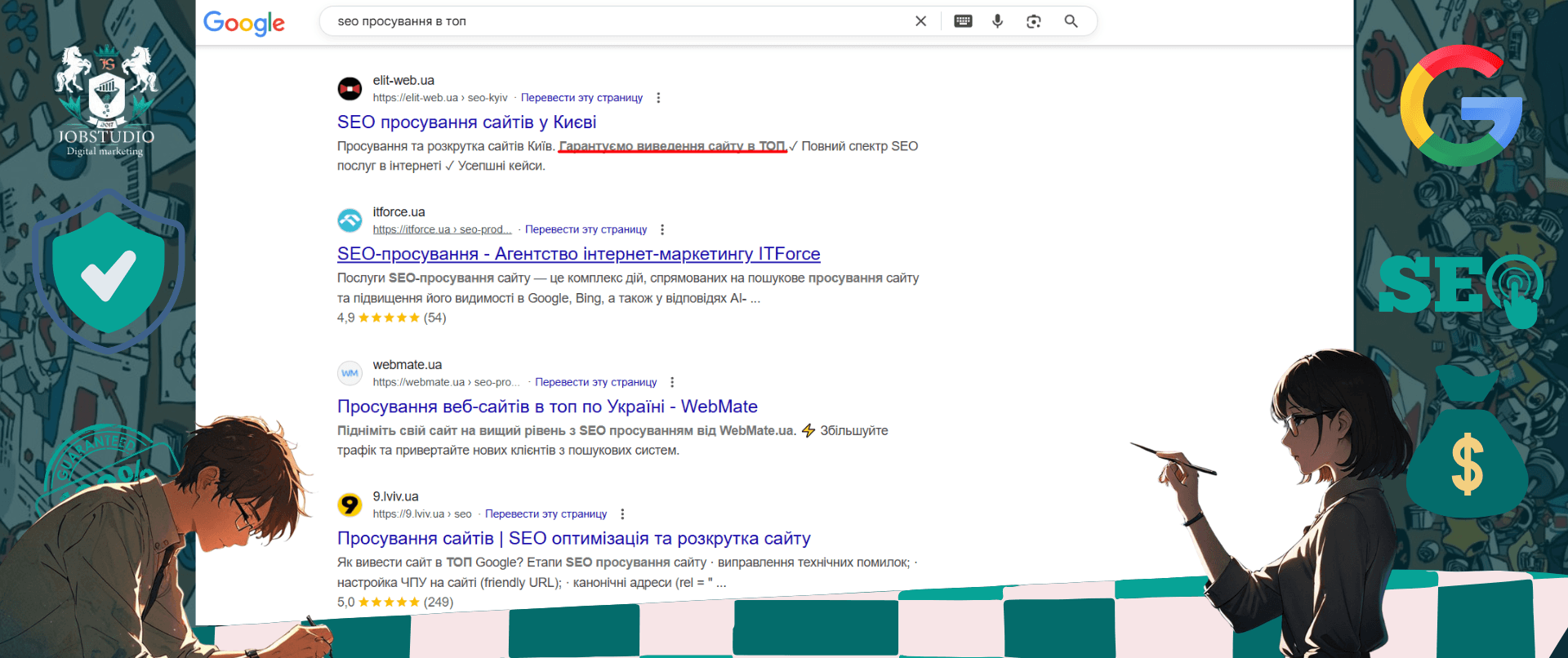Contact us now!



The word “guarantee” sounds beautiful. It inspires trust and gives a sense of security, because when we hear it, we immediately think of quality, reliability and responsibility. For the client, it is a signal: “everything will be fine, there are no risks.”
Of course, agency managers know how this works, so the word “guarantee” has a special place in their presentations. They promise results, TOP-3, traffic growth… It sounds good, doesn’t it? However, clients still ask: “What are your guarantees?”. This forces managers to come up with new wording to hit the most sensitive point.
Table of Contents
In order not to fall into the trap, I propose to understand this issue together.
Here are just a few examples of such “good” promises:
It sounds convincing, but if you look closely, these are not guarantees of results. These are just beautiful words designed to relieve fear and push you to make a deal.
That is why the topic of guarantees in SEO is one of the most controversial. Below, we will analyze which guarantees are fake and which can be considered real.


The main problem is that we don’t control Google or Bing.
Imagine: you’ve done the perfect optimization, but it’s the search engine that decides who will be in the results every day.
Even Google’s Danny Sullivan confirmed this in an interview with Barry Schwartz. According to him, Google makes up to 5000 changes to its search algorithm every year.
Most of them are invisible, but some can change the balance of power in search results.


This is compounded by competitors who are constantly implementing new strategies. And then there are hundreds of ranking factors:
It turns out that companies that promise “100% guaranteed TOP” seem to have a “black box” of Google’s algorithm. You understand that this is impossible.
Guarantees are the thing that most strongly influences your decision to sign a contract. Unfortunately, this is what makes them a tool for manipulation. Let’s take a closer look at the most common examples.


At first glance, this is impressive: “Your site will be in the top 3 for a hundred queries.” But ask yourself: what kind of queries?
Keep in mind that in the first months, cooperation will be based on a subscription fee. And the most important thing is that the way the promised result will be achieved directly affects your satisfaction or disappointment with the fulfillment of the guarantees. “Be afraid of your desires…” is exactly what binary guarantees are about.
How does it work? First, you are given the semantic core of the site (for example, 100 keywords). Then they promise to bring the site to the TOP for 70-80% of key queries. It sounds tempting, but anyone who has ever been involved in promotion understands that being in the top for some queries does not guarantee an influx of targeted traffic or sales growth.
And it’s not the fault of the “evil SEO”, but the specifics of promotion. Low-frequency, non-competitive queries are the first to reach the top, which are necessarily needed to “pump up” the fatter ones. And here’s the result: 70% of queries are in the top, and the phone is silent. The terms of the contract have been fulfilled. Applause.
When collecting the semantic core, some agencies do not provide the customer with information about the exact frequency of queries. By including low-competitive queries in the list and bringing them to the TOP, the contractor ensures payment for services, but your sales under such conditions will be minimal.
There is another situation: a contractor guarantees you a high ranking on Google or Bing for popular queries (for example, “plastic windows”) in a short period of time. Most likely, your site will be promoted using black hat or gray hat SEO methods: cheating on behavioral factors, spamming content, etc. Because of this, there is a high risk of sanctions on the site – from a rollback of positions to a complete ban. Eliminating the consequences can take a long time, during which you can forget about sales from the site.
The result is formally achieved, and your site is “in the top”. But it doesn’t bring any real visitors or sales.
The trap: You pay for positions, not business results.
It often looks like a promise: “100 links per month” or “10 articles”. But volume is not quality.
Links can be placed on junk sites or in outdated directories. And articles can be “watery” and written only for the search engine, not for the user.
The trap: You receive reports with numbers, but these actions do not improve either positions or sales.
A convenient formulation. But how do you measure “quality”?
The contractor can always say: “We did everything well from a technical point of view,” even if there is no result. Contracts rarely specify clear quality KPIs.
The trap: You get an abstract promise that cannot be verified.
To be honest, this is not a guarantee at all. This is a standard condition of any contract. If a company presents a “fixed price” as its main advantage, it means that it has no other strong arguments.
The trap: They try to “hook” you with a trifle that has nothing to do with SEO results.
Or the option: “We can’t guarantee anything because it contradicts the Google/Bing license.”
It is true that a contractor cannot control a search engine. However, reputable SEO companies do not hide behind this. They guarantee the professional performance of those important tasks that are the basis for obtaining results in the form of high rankings and increased traffic to your website, even if they cannot guarantee the result itself.
The trap: The contractor effectively disclaims any responsibility.
At first glance, this sounds right: no “black” schemes. But there is a nuance:
This is just a description of the methodology, not a guarantee of results. “White-hat SEO is the foundation, but it does not guarantee either traffic or positions.
The trap: You hear a beautiful phrase that promises nothing concrete.
Such slogans are often written in advertising, but you will never see them in real contracts.
Search positions are formed over months, not days. If a website suddenly jumps to the top, it is almost always the result of manipulation (behavioral cheating, link networks). Such methods quickly lead to sanctions.
The trap: You spend money, get a short-term “jump”, and a month later your site loses positions or falls under filters.


Fake guarantees are always attractive. But they replace the true value of SEO – long-term business growth – with formal metrics. You are paying for an illusion, while there may be no real sales or profit.
Guarantees in SEO are perhaps the most controversial sales tool. They are attractive, but they often hide a completely different reality.


This is the type of “guarantee” that you want to believe the most. For example, you may be promised: “we will bring the site to the TOP in 3 months“, or “we will bring 1000 visitors per day”, or even “we will provide 100 calls“.
How it works: the agency forms a semantic core of 100 keys and promises to bring the site to the top for 70-80% of them. You think we’re talking about competitive queries, such as “buy iPhone in Kyiv,” but in fact, low-frequency queries are the first to reach the top, such as “buy iPhone in Lukianivka for 5000 UAH.” Formally, the promise is fulfilled, but there are no calls or sales.


There are pitfalls here: there is no transparency about the frequency of queries, the conditions are met on paper, but the business result is zero. If the guarantee is for high-frequency queries, gray methods are often used, leading to Google sanctions.
What you should do: always ask to see the real frequency of queries, demand a balance of queries: low-, medium-, and high-frequency. Also, ask not only about “positions” but also about projected traffic and potential conversions.
This is a popular scheme where you pay for additional traffic above the basic level. The contract often stipulates the fixation of the starting traffic, the rate per visitor, and the upper limit of the budget.
The reality is that traffic can be untargeted (bots or junk queries), and the agency can simply “inflate” the indicator without working on quality. exclude In addition, they often take into account queries with your brand name to artificially increase traffic in reports.
What you should do: monitor not only traffic but also conversions (leads, calls, sales) and demand a transparent payment formula. Check the dynamics in Google Analytics / Bing Webmaster.
At first glance, it sounds perfect: “If there is no result, we will refund the money.”
But the reality is different. Only large agencies can afford this, but they build all the risks into the overpriced price. A common scenario is that the agency works “for free”, performing a minimum amount of work, and you lose time. Usually, only part of the amount is refunded, for example, 50% of the monthly fee for one month.
What you should do: read the contract carefully to understand what exactly the money is being returned for. And always remember that even in case of a refund, you lose the most important thing – time.
This scheme seems fair: “If we bring clients, we get a percentage.”
But remember that SEO is a long process. The first sales may come only after a few months, and no one will work for free during this time, so you still pay a subscription fee. In addition, an experienced SEO specialist will ask for a large percentage, essentially a share of your business.
What you should do: clearly define the profit-sharing model and realize that an SEO specialist (agency) actually becomes a co-owner of your business.
This is the only type of guarantee that really makes sense. The bottom line: the agency charges for a clearly defined scope of work or hours of specialists.
It’s easy to check: there is a list of tasks with time control over how long it took to complete them. The professional approach of the agency to the implementation of the tasks agreed with you will provide the result in the form of an increase in positions for important queries, as well as an increase in visitors to your website, everything is quite transparent. It is important to discuss when, what parameters and in what form you will record the results of the tasks performed.
The only downside is that you need to have basic SEO competence to check the quality.
What you should do: demand a phased work plan with deadlines, check the reports and ask questions in plain English. If there is no expertise, order an independent audit.
This model looks like a compromise: a fixed subscription fee plus a bonus for achieving KPIs.
Usually, KPIs such as ROMI (return on investment), website visibility by semantics (list of queries), conversions (but often only those that are “convenient” for the contractor), CPL (cost per lead), and CPA (cost per acquisition) are highlighted.
There are pitfalls here. Most of the budget is still spent as a fixed amount, and KPIs can be disconnected from real business goals (for example, traffic is growing, but there are no sales). In addition, unscrupulous contractors “draw” statistics for one KPI, hiding failures in others.
What you should do: insist on a comprehensive assessment of KPIs, not just one indicator, agree on the metrics that are important to the business (for example, the number of orders, not just traffic), and clearly state the formulas in the contract.
There is an important observation here: most contracts do not contain guarantees at all. They are only verbalized during the sale. But in a legal document, contractors leave themselves completely free. They either don’t mention warranties at all, or they include wording like “the contractor is not responsible for the result, which depends on a third party (Google, Bing).” This is a critical point: everything that you have been “sold” in words may turn out to be just air.


An agreement that contains guarantees needs to be thought through very carefully before signing. What to do with these costs is an open question. You can, of course, try to pass them on to the client…
The client wants the contractor to assume the risks, so the contractor includes them in the contract. An insecure contractor is afraid to say directly that not everything depends on him. The insurer’s business and the professional services business are not the same.
It is difficult to write guarantees in such a way that they seem to be there, but they don’t seem to be. A confusing and dishonest contract reduces trust and conversion more than a simple and principled position.
To structure it, let’s look at the main guarantee schemes.
| The essence of the guarantee (what is written in the contract) | Reality and pitfalls | What the client should do | Example. |
|---|---|---|---|
| Binary guarantees (TOP-3, 1000 visitors/day, 100 calls) | Often achieved through manipulations: promotion on low-frequency channels or “gray methods”. Risk of sanctions and banning. | Ask for the frequency and relevance of keys; demand a transparent core; check the dynamics of traffic and conversions. | The promise of “70% of keys in the TOP” → they display low-frequency queries, but no calls. |
| Payment for traffic | It is easy to catch up with low-quality or bot traffic. When the budget ceiling is reached, the contractor may go into stagnation. | Agree on the bar, cut off brand requests; evaluate not only the number but also the conversion. | The client pays for 10,000 visitors, but there are zero sales. |
| Financial guarantee (money back) | Only large agencies that build risks into high budgets can afford it. Often, they return partially or perform a minimum amount of work. | Assess the cost of risk: are you willing to pay “three times as much” to get a formal refund? | The agency promises a “refund,” but the price of services is overstated by several times. |
| Paying a percentage of sales | SEO gives results in months, so the contractor will still charge a monthly fee. An experienced optimizer may demand a share of the business. | Avoid the scheme if you are not ready to become an SEO partner. | Newcomers offer to “work for %”, but in the end, you lose time without results. |
| Guarantee the quality of work | This is fair, but the “quality” is vague. The client needs to be able to check it. | Fix the list of works in the contract, demand a report and an explanation of “why each step is necessary”. | Payment for hours/month of work; the client receives a checklist of what has been done. |
| Payment by KPI | Includes a subscription fee + bonus. Problem: choosing KPIs that are convenient for the performer, ignoring complexity. | Look not only at 1 metric, but at the result in the complex: traffic + conversions + sales. | An SEO shows “+300% traffic” but no sales. |
| “We guarantee the amount of work” | A formal excuse. They check the box, but there is no business result. | Check the relevance of the work. | 100 links from dubious directories. |
| “We guarantee the price is unchanged” | Has nothing to do with the result. | Ignore it as a “buzz phrase”. | Just a fixed monthly fee. |
| “Results in 7 days” | A marketing slogan, it will not be in the contract. | Do not be fooled. | The advertisement promises “TOP”, but the contract contains only technical work. |
We do not promise “TOP-3 in 7 days”. Instead, we guarantee what we are really responsible for: a complete list of works, the professional and high-quality implementation of which will lead to the achievement of business goals, transparency, compliance with deadlines, security and adequate expectations for positive dynamics of position and traffic growth. We keep our finger on the pulse of all Google and Bing updates to quickly adapt your strategy. Just as a lawyer cannot guarantee a certain court decision, an SEO specialist cannot guarantee specific positions in the top. But you can be sure that the JobStudio team will make every effort and do everything possible to ensure that your website is in the top positions.


What we guarantee: Each of our tariffs has a clear list of tasks. We will fulfill and report on everything on it. If a task has already been implemented on the website, we will still check its correctness and make changes if necessary.
You can track our work online from anywhere in the world, thanks to the fact that each of our clients has access to all the files in which the work is being done and you can monitor the task in real time, you can immediately ask a question to the performer or write a comment so that we can immediately take this information into account when performing a particular task.
Example: In the tariff, there are “set up analytics goals” and “check page indexing”. If the goals have already been partially created, we do not “skip” this block, but check, test, and correct them. If a specialist closes a task but doesn’t add one of the goals, you get 10% compensation, and we finish the task.
What we guarantee: After each stage, you will receive a detailed report. It describes exactly what was done, why it is important, provides recommendations, describes the expected effect of the implementation, and prepares the ToR (terms of reference) for the relevant specialists.
IMPORTANT: You can show this report to an independent expert.
What we guarantee: each stage has a clear deadline.
What we guarantee: we work exclusively with “white” methods recommended by Google and Bing. Before making any changes to the website, we make a backup copy. We keep all your accesses encrypted.
What we guarantee: we are honest about the realistic horizon of results. You will see the first noticeable changes in 2-3 months, and a significant financial return will appear in 6+ months, provided that our team and the responsible specialist from the client’s side work together.


We don’t promise a “quick top” for one simple reason: according to Ahrefs, only 1.74% of new pages reach the top 10 of Google within a year. Out of 2 million new English-language pages, only 6.11% reach the top ten within a year. And the average age of a page on the No. 1 position is about 5 years.
Example: You are expecting “TOP 3 in a month” in a competitive niche. We immediately explain the realities: focusing on the technical base, semantics, content strategy, and link building gives you gradual positive dynamics, not a “leap in a week.”
What we guarantee: Our achievements described in real cases are the best guarantee of our professional work!
You can always request case studies, portfolios, or letters of recommendation from your or a related niche, get a step-by-step action plan with explanations (what we do, why, and what effect we expect), as well as a transparent budget with a breakdown of all costs.
Example: You ask for an e-commerce case study in a similar category. We send you the starting metrics, a list of works, monthly dynamics of traffic, visibility, conversions, key solutions (structure, clustering, linking), and the results in numbers.


“Scope of work guarantee” is not a guarantee of effect; quality and relevance are important. A “price guarantee” is a basic condition, not a promise of results. “Results in 7 days” is an advertising slogan that will not be in the contract. “Pay per traffic/KPI” works only in a set of metrics (traffic + conversion + sales), otherwise it is a field for manipulation.
Our approach is simple: contractual and transparent guarantees for the process, clear SLAs, safe methods, and a realistic results horizon. This is the format of “guarantees” that really works in SEO and does not mislead clients.
Guarantees in SEO are a topic that always causes controversy between clients and contractors. For some, it is a symbol of confidence and professionalism, while for others it is a classic marketing manipulation. Just as a lawyer cannot guarantee a certain court decision, an SEO specialist cannot guarantee specific positions in the TOP. But you can be sure that the JobStudio team will make every effort and do everything possible to ensure that your website is in the top positions. Let’s summarize the main points.
Promises like “TOP-3 in 7 days”, “1000 clients in a week” or “we will rank your website for 300 keywords” sound attractive, but in practice have nothing to do with reality. The fact is, according to Ahrefs, only 1.74% of new pages reach the top 10 of Google within a year. This means that “quick guarantees” simply contradict the statistics. In addition, such claims are often based on low-frequency queries or “gray” methods that create the illusion of results but do not bring business value.
Real guarantees in SEO are not related to positions, but to the process. It’s about quality work, meeting deadlines, transparent reporting, as well as safety and working exclusively with white hat methods. These are the things for which a contractor can really be held accountable.
At first glance, phrases like “we guarantee the top for 70% of the keys” seem beneficial. But in reality, they harm the client. They shift the focus of specialists from business profit to fulfilling formal conditions. Metrics are chosen to be easy to fulfill, even if they don’t generate sales. And to minimize risks, the contractor can only promote weakly competitive requests that have no effect. As a result, the client receives beautiful numbers in the reports, but does not make a profit.
When an agency promises to “make your money back,” it already includes these risks in the contract price. Therefore, you pay much more, and in case of failure, you receive only a partial refund and lose the most valuable thing – your time.
To avoid falling into the trap, you should focus on specifics rather than buzzwords. Look for a customized offer, not a template. Pay attention to the number of projects in progress so that your website is not left to chance. The price should be at the average level or higher, because cheap SEO often works through black hat methods. Check real cases and reviews, and whether they have a team of specialists, not just one generalist. It is also important that there is technical support and a step-by-step plan with explanations of why each action is necessary, as well as a transparent budget.


SEO doesn’t deliver instant results. It’s a long, gradual process that depends on hundreds of factors, the main one being the search engine. The first results are usually visible in 2-3 months, and a tangible financial return comes in 6+ months. Keep in mind that the average age of a page in the top 1 of Google is 5 years. Therefore, the real guarantee in SEO is not the “eternal TOP” but systematic work, transparency, and trust.


Clients should not trust “magic guarantees” of results. Look for a partner who guarantees the quality of the process, meeting deadlines, transparency, and willingness to take responsibility for their work.
Such guarantees are valuable in SEO, and such transparent guarantees are provided by JobStudio, and the success in the end will be a direct result of our joint, consistent work.
Ask us a question about guarantees right now!